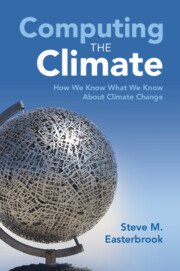Refine search
Actions for selected content:
2860 results in Computing and Society
Contents
-
- Book:
- Humor 2.0
- Published by:
- Anthem Press
- Published online:
- 28 February 2024
- Print publication:
- 15 August 2023, pp v-vi
-
- Chapter
- Export citation
8 - Dogecoin, the Joke Currency
-
- Book:
- Humor 2.0
- Published by:
- Anthem Press
- Published online:
- 28 February 2024
- Print publication:
- 15 August 2023, pp 85-92
-
- Chapter
- Export citation
Part 3 - Multimodality
-
- Book:
- Humor 2.0
- Published by:
- Anthem Press
- Published online:
- 28 February 2024
- Print publication:
- 15 August 2023, pp 173-174
-
- Chapter
- Export citation
Author Index
-
- Book:
- Humor 2.0
- Published by:
- Anthem Press
- Published online:
- 28 February 2024
- Print publication:
- 15 August 2023, pp 271-274
-
- Chapter
- Export citation
Frontmatter
-
- Book:
- Humor 2.0
- Published by:
- Anthem Press
- Published online:
- 28 February 2024
- Print publication:
- 15 August 2023, pp i-iv
-
- Chapter
- Export citation
13 - A General Theory of Grumpy Cats
-
- Book:
- Humor 2.0
- Published by:
- Anthem Press
- Published online:
- 28 February 2024
- Print publication:
- 15 August 2023, pp 131-138
-
- Chapter
- Export citation

Computing the Climate
- How We Know What We Know About Climate Change
-
- Published online:
- 10 August 2023
- Print publication:
- 24 August 2023
4 - The Problem of Platform Self-control
-
- Book:
- The Networked Leviathan
- Published online:
- 20 July 2023
- Print publication:
- 03 August 2023, pp 109-139
-
- Chapter
-
- You have access
- Open access
- HTML
- Export citation
6 - Platform Democracy Now!
-
- Book:
- The Networked Leviathan
- Published online:
- 20 July 2023
- Print publication:
- 03 August 2023, pp 167-200
-
- Chapter
-
- You have access
- Open access
- HTML
- Export citation
5 - Actually Existing Platform Self-constraint … Up to a Point
-
- Book:
- The Networked Leviathan
- Published online:
- 20 July 2023
- Print publication:
- 03 August 2023, pp 140-166
-
- Chapter
-
- You have access
- Open access
- HTML
- Export citation
1 - The Nature and Problems of Platforms
-
- Book:
- The Networked Leviathan
- Published online:
- 20 July 2023
- Print publication:
- 03 August 2023, pp 28-44
-
- Chapter
-
- You have access
- Open access
- HTML
- Export citation
Introduction
-
- Book:
- The Networked Leviathan
- Published online:
- 20 July 2023
- Print publication:
- 03 August 2023, pp 1-27
-
- Chapter
-
- You have access
- Open access
- HTML
- Export citation
2 - The Enterprise of Platform Governance Development
-
- Book:
- The Networked Leviathan
- Published online:
- 20 July 2023
- Print publication:
- 03 August 2023, pp 45-79
-
- Chapter
-
- You have access
- Open access
- HTML
- Export citation
Index
-
- Book:
- The Networked Leviathan
- Published online:
- 20 July 2023
- Print publication:
- 03 August 2023, pp 239-245
-
- Chapter
-
- You have access
- Open access
- HTML
- Export citation
3 - The Problem of Platform Knowledge
-
- Book:
- The Networked Leviathan
- Published online:
- 20 July 2023
- Print publication:
- 03 August 2023, pp 80-108
-
- Chapter
-
- You have access
- Open access
- HTML
- Export citation
Conclusion
-
- Book:
- The Networked Leviathan
- Published online:
- 20 July 2023
- Print publication:
- 03 August 2023, pp 201-210
-
- Chapter
-
- You have access
- Open access
- HTML
- Export citation
Contents
-
- Book:
- The Networked Leviathan
- Published online:
- 20 July 2023
- Print publication:
- 03 August 2023, pp v-viii
-
- Chapter
-
- You have access
- Open access
- HTML
- Export citation
Copyright page
-
- Book:
- The Networked Leviathan
- Published online:
- 20 July 2023
- Print publication:
- 03 August 2023, pp iv-iv
-
- Chapter
-
- You have access
- Open access
- HTML
- Export citation
Acknowledgments
-
- Book:
- The Networked Leviathan
- Published online:
- 20 July 2023
- Print publication:
- 03 August 2023, pp ix-x
-
- Chapter
-
- You have access
- Open access
- HTML
- Export citation
References
-
- Book:
- The Networked Leviathan
- Published online:
- 20 July 2023
- Print publication:
- 03 August 2023, pp 211-238
-
- Chapter
-
- You have access
- Open access
- HTML
- Export citation
